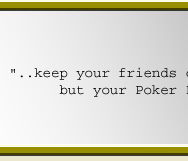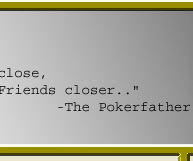(Click Here for the Latest Online Poker News Stories)
Copyright 2005 Knight Ridder/Tribune Business
News
Copyright 2005 Pittsburgh Post - Gazette
Pittsburgh Post - Gazette
July 13, 2005, Wednesday
HEADLINE: More women are betting on online
poker
BYLINE: By Mackenzie Carpenter
BODY:
At last, Hollywood B-actress and ubiquitous partygoer Jennifer
Tilly has become known for more than her recent star turn in "Seed
of Chucky." It turns out she is one heck of a poker
player, beating out 600 players to win $ 158,625 in the Ladies
no-limit Texas
Hold 'Em event at the World Series of Poker last month.
But representatives of online
gambling interests would like you to know that Tilly is something
of an aberration in the mostly male world of poker tournaments
in Las Vegas and Atlantic City. According to the folks at Sportsinteraction.com,
women now outnumber men at so-called Internet casinos; they cite
industry studies that show "many women prefer to double down
while sitting at home in front of a PC."
Ever since the first online casino was launched in 1995, Internet
gambling has grown exponentially, with estimated revenue of
more than $ 6 billion a year and nearly 2,000 Web sites offering
everything from sports betting, lotteries and blackjack to bingo.
According to one industry study, 53 percent of those who gamble
online rather than in casinos in the United States were female,
and the numbers -- like those of women gamblers generally -- are
growing.
"If you had a choice between dressing up and traveling to
a casino only to breathe in cigarette smoke, drink watered-down
cocktails and get hit on, or staying home in your bathrobe and
having the same gambling experience, which would you choose?"
e-mailed Alana Sorrentino, a New York public relations representative
of Sportsinteraction.com.
Well, duh, said Meagan Cooper, 27, of Springfield, Pa., who was
offered up by Sorrentino to answer the question. Cooper readily
admitted that she prefers playing
poker in her pajamas.
"Sometimes when I can't sleep, I just go online and play
for a few minutes, and then go back to bed," she said. Plus,
"I think for women, especially, it's a good way to learn
the game."
While she has played in Atlantic City with her girlfriends and
said she will continue to do so, Cooper said she finds that the
testosterone-laden atmosphere of poker tournaments "can be
intimidating."
"It's easier to bluff when you're online. ... At these poker
games, you've got these people, men and women, wearing sunglasses,
but playing on a computer, this way, it's your own form of sunglasses."
Online poker and
other games of skill have become alternatives for women because
they don't "have the same macho element, the same level of
competitiveness and people butting heads as they do in a casino,"
added Anthony Munnelly, vice president of sports and events for
Sportsinteraction.com.
At his Web site, a player downloads an application onto her computer,
installs it and creates an interface that connects with other
online "tables." At that point, the player can select
how much she wants to gamble and can start to play.
"The technology has increased so much that it is now a very
smoothly run operation," Munnelly said.
All of this comes as bad news to Diane Berlin of the Pennsylvania-based
National Coalition to Ban Legalized Gambling, who says Internet
gambling is "very scary" to begin with.
"Because it is so private, you can hide your losses even
more easily than a trip to the casino or bingo hall, and people
can be in extremely deep trouble before the family has any clue
as to what is happening," she said.
For women, in particular, the risks are great, she said, noting
studies that show men and women gamble for different reasons.
"Action gamblers" tend to be men, in search of a "high"
by playing games of skill like poker,
blackjack or sports betting. Women, on the other hand, tend to
be "escape" gamblers, attracted to games of chance like
slot machines, video poker, lotteries or bingo, using gambling
as a way to escape depression or physical or emotional pain.
"This is a very lonely person's activity," said Berlin
of Internet gambling, "and maybe this is why many women are
being lured into it."
Indeed, Christine Mooney, a 57-year-old Staten Island resident
and devotee of Casino Fortune, another online site, admits she's
had "a problem with gambling off and on."
Still, she says online betting is preferable, for two reasons.
First, she's disabled, which makes travel to casinos difficult,
and second, "I don't go wild. At a casino, you can get so
carried away you run over to an ATM machine and unload your life's
savings in the spur of the moment. You can't do that online."
The apparent public relations offensive to promote Internet gambling
for women comes at a time when the legality of the practice is
still being debated.
Most Internet gambling sites are based in Canada and the Caribbean,
but officials at the U.S. Department of Justice say they're illegal,
citing the U.S. Wire Act of 1961, which prohibits taking bets
over the telephone and "wires," and the Professional
and Amateur Sports Protection Act of 1992, which banned sports
wagering in all states except those with pre-existing operations
-- Nevada, Oregon and Delaware.
Nonetheless, enforcement is difficult. Online bettors aren't
targeted in their homes, while going after foreign online companies
is difficult, officials acknowledge.
Legislation introduced in Congress banning the practice has gone
nowhere. Further muddying the waters, a U.S. Appeals Court ruling
found casino games to be legal but not online sports betting.
Moreover, earlier this spring the World Trade Organization ruled
that U.S. gamblers should be allowed access to offshore gambling
casinos, claiming that U.S. federal and state laws prohibiting
the practice breached international trade agreements.
Still, the WTO appeals panel said that some restrictions were
necessary "to protect public morals and maintain public order."
Since both U.S. law enforcement and Internet gambling officials
interpreted that language as a win for them, the issue still appears
to be unresolved.
Internet gambling
operators, like Munnelly, insist that it's all above board.
"We're based in Canada and regulated out of Canada,"
he said, noting that his company's headquarters is located just
outside of Montreal. "So our players are essentially betting
in Canada."
Until the legalities get sorted out, representatives of casinos
and their possible online competitors seem to be under some kind
of uneasy truce.
Still Internet gambling will never replace casinos, said Holly
Thomsen of the American Gaming Association, which represents the
bricks-and-mortar part of the industry. People go to casinos for
more than just gambling, she noted, such as for dining, shows,
shopping and other diversions.
"Sitting in your living room playing online poker is a solitary
activity, while visiting a casino is an inherently social activity,
an entertainment activity," Thomsen said. "The social
interaction and the energy of the environment lend a truly unique
and exciting element to the experience that you just can't get
from a computer screen."
-----
To see more of the Pittsburgh Post-Gazette, or to subscribe to
the newspaper, go to http://www.post-gazette.com. Copyright (c)
2005, Pittsburgh Post-Gazette
Distributed by Knight Ridder/Tribune Business News.
For information on republishing this content, contact us at (800)
661-2511 (U.S.), (213) 237-4914 (worldwide), fax (213) 237-6515,
or e-mail reprints@krtinfo.com.
(Click Here for the Latest Online Poker News Stories)
|






